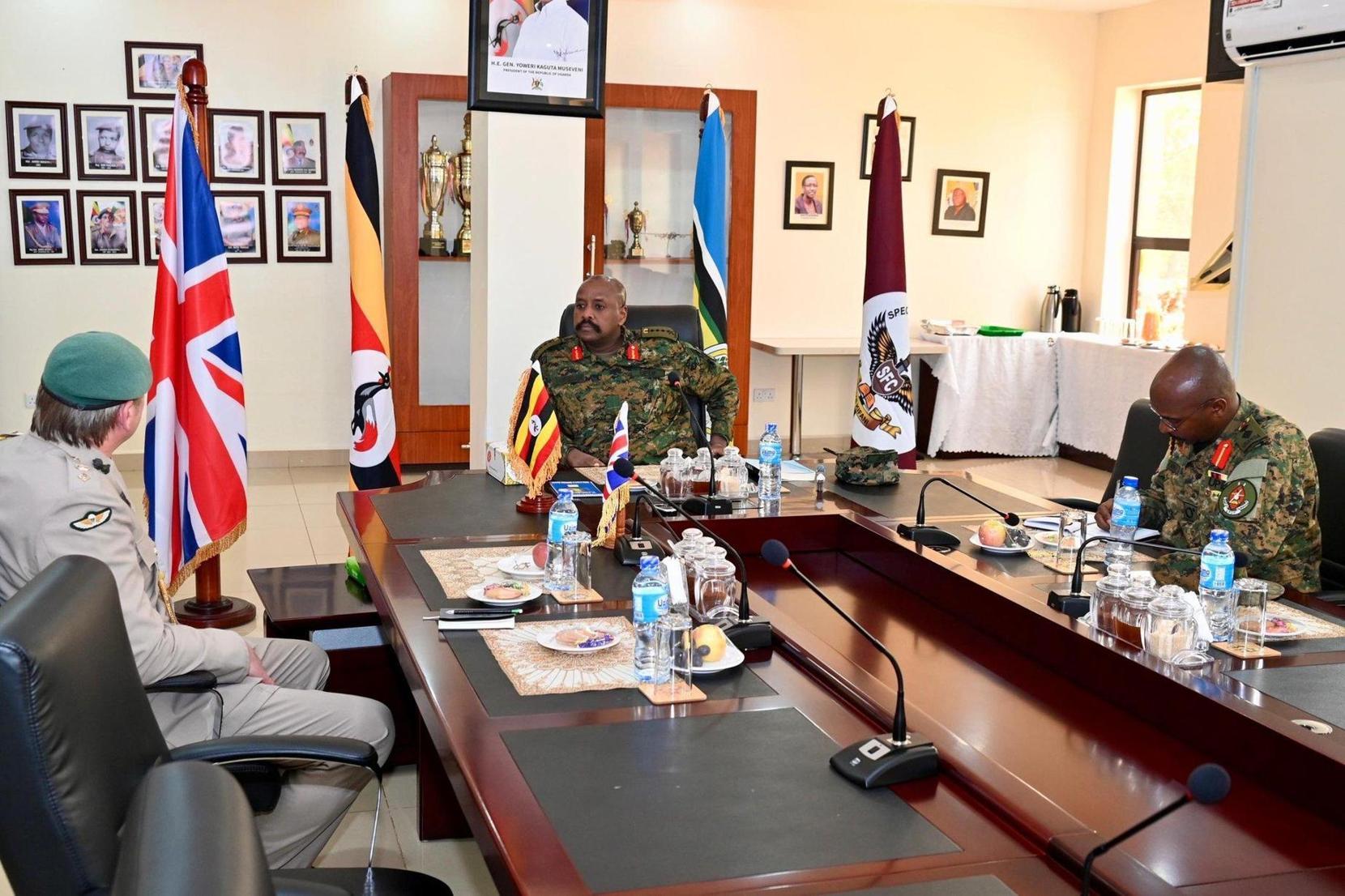By Faridah N Kulumba
Africa-Press – Uganda. Uganda’s Chief of Defence Forces (CDF) of UPDF, Gen Muhoozi Kainerugaba held talks with Lt Col Ash Wiseman, the British Defence Attaché to Uganda, to discuss areas of mutual interests between the two nations. The meeting took place at the Special Forces Command headquarters in Uganda on 29 August 2025 focused on enhancing military cooperation between Uganda and the United Kingdom. The two military leaders explored ways to build on existing relations and to strengthen their partnership on regional and international security issues. This meeting happened weeks after Uganda’s’ Minister of Foreign Affairs, General Jeje Odongo Abubakhar, held a meeting with H.E. Lisa Chesney, the High Commissioner of the United Kingdom to Uganda, at the Ministry’s headquarters in Kampala to enhance diplomatic ties between the two governments.
The key issues discussed
The two military leaders explored ways to build on existing relations and to strengthen their partnership on regional and international security issues. The meeting underscored their commitment to building longstanding defence relations between Uganda and the United Kingdom. “The meeting explored avenues of mutual interest aimed at enhancing cooperation and strengthening the partnership of regional and international security issues,” the Uganda People’s Defence Forces (UPDF) said in a statement.
What Uganda gains from this cooperation
Uganda and Britain’s defence cooperation offers significant benefits to Uganda in several ways including enhanced security, improved military capacity through training and equipment, better peacekeeping and regional stability efforts, and the promotion of good governance and anti-corruption measures. The two nations collaboration helps Uganda’s armed forces maintain internal and external security while aligning with its national development goals by fostering a more stable and secure environment necessary for economic and social progress.Through this collaboration, Uganda is able to protect its borders and maintain internal security, which is crucial for economic development and citizen safety.
By working with Britain, Uganda can strengthen regional security frameworks and participate more effectively in collective efforts to manage threats, contributing to broader peace in the East African region. The UK has supported Uganda’s participation in peace support operations and counter-terrorism initiatives across the region.
In terms of training, the partnership provides access to modern military training, advanced equipment, and best practices, which helps professionalize Uganda’s armed forces and improve their operational effectiveness. The United Kingdom has provided training for Ugandan officers at its prestigious Royal Military Academy Sandhurst, where Gen Kainerugaba himself graduated before rising through the ranks to head the (Uganda People’s Bank Force (UPDF). General Muhoozi has played a central role in sustaining Uganda’s international defence partnerships, which Western officials view as important in countering terrorism and piracy threats in East Africa.
How the UK gains from the partnership
Stability -Uganda is a key contributor to regional stability efforts, having deployed troops under the African Union Mission in Somalia (AMISOM) and joint operations in the eastern Democratic Republic of Congo against Islamist militants. Analysts say Uganda’s military cooperation with traditional partners like the UK is critical for its continued role in regional security. Intelligence- this partnership also includes intelligence sharing and capacity-building to counter threats like terrorism and illicit trade, indirectly enhancing British security interests. Furthermore, the relationship fosters strong diplomatic ties through shared history and Commonwealth membership, which can translate into broader economic and political advantages. Calculated partnership-through its defence ties, the UK strengthens its diplomatic and political relationship with Uganda. This helps maintain its influence and partners with a country considered an “anchor state” for economic and political integration in East Africa.
Power- By supporting Uganda’s role in regional security, the UK reinforces its image as a partner for stability, despite criticisms regarding human rights in some contexts.
Other links between Uganda and the UK. The colonization of Uganda Britain began around 1860. In 1888. Britain assigned political and economic power over the region to the British East Africa Company by royal charter. The Company’s control over the area was consolidated in 1891 when a treaty was signed with the Buganda, then the area’s principal kingdom.In 1894 the British government assumed power, declaring Baganda a protectorate. This protectorate was expanded in 1896 to include other regions. Uganda was ruled by the British beginning in the late 1800s and it gained independence on Oct. 9, 1962. Uganda and the UK share strong historical, cultural, and economic ties, stemming from Uganda’s time as a British protectorate until its independence. These ties are reflected in ongoing collaboration on development, trade, and cultural exchange, with the UK being a significant development partner for Uganda.
Britain is a major development partner, working with Uganda on various initiatives to reduce poverty and promote sustainable development. The two countries also cooperate in trade. Over 100 UK companies operate in Uganda, and the UK government provides support for trade and investment between the two nations. There is also a growing trade relationship, with total trade in goods and services reaching £478 million in 2022. Uganda and Britain are members of the Commonwealth, fostering continued cooperation and shared values.
For More News And Analysis About Uganda Follow Africa-Press






